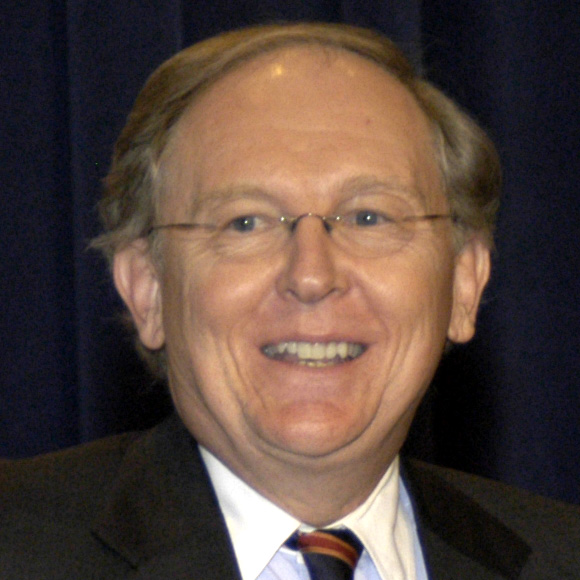After Bin Laden – What Next?
Tower Center Diplomat Robert Jordan writes about what to expect after the killing of Osama Bin Laden.

By Robert W. Jordan
The sudden killing of Osama Bin Laden in Pakistan jolts us all into a complex mixture of emotions, memories and conclusions. Nearly all of us remember where we were on September 11, 2001. Others remember hoping that Bin Laden would be quickly captured or killed. And some of us recall working with brave men and women dedicated to hunting him down, denying him access to terrorist financing, and dealing with the ideological cesspool that he so viciously promoted.
 Robert W. Jordan |
Just four weeks after the attacks of September 11, while the ruins of the World Trade Center were still smoldering, I landed at night in Riyadh to take charge of my mission as the new U.S. Ambassador to Saudi Arabia. As I entered the terminal from the 22-hour plane trip, I met my new, heavily armed Saudi bodyguards. Were they friend or foe? Most of the hijackers who had killed nearly 3,000 Americans on 9/11 were Saudis. Osama Bin Laden was their leader and inspiration. What was I facing?
At the time of my October arrival, coalition forces had just begun bombing the Taliban strongholds in Afghanistan, with many sorties launched from Prince Sultan Air Base outside of Riyadh. Our coalition was growing amid the worldwide outrage at the attacks on innocent men, women and children a month earlier. I began spending hours with our generals and civilian leaders, as well as their Saudi counterparts, who were working to defeat the Taliban and find Bin Laden. I received a letter of heartfelt apology and condolence from the head of the Bin Laden family, obviously devastated by the unthinkable evil of his half-brother. Over the ensuing months, I would be alerted several times by my intelligence officers to hopeful signals that we had Bin Laden in our sights. In the depths of the coalition operations center I monitored giant screens depicting drone aircraft attacks on murky images of convoys believed to include Bin Laden.
None of those attacks found their elusive prime target.
Perhaps Bin Laden’s greatest blunder was his decision to launch an attack within Saudi Arabia. On May 12, 2003, Al Qaeda suicide bombers struck three housing compounds in Riyadh, killing a number of Americans. Even more of the victims were Saudis and other Muslims. If there had been any doubt about the commitment of the Saudi leadership to take the offensive against Bin Laden and Al Qaeda, they were resolved that night. Immediately the Saudi security forces went after Al Qaeda cells and those harboring them. Saudi citizens, outraged over the attack on innocent civilians in their homeland, began providing tips to Saudi intelligence. Over time, Al Qaeda’s threat was dramatically reduced in the Kingdom and its adherents largely dispersed to Yemen and other locations.
To be sure, Bin Laden remained a strong symbol and recruiter for those wishing to wage jihad on the West and its allies. But Bin Laden’s flight to the caves of Tora Bora and ultimately to his villa in Pakistan meant that his operational role was compromised. Al Qaeda metastasized into splinters, often highly dangerous but no longer coordinated daily by its founder.
It is no small irony that the Arab spring we are witnessing has demonstrated how irrelevant Al Qaeda and bin Laden have become to the aspirations of millions of citizens in this part of the world. Facebook, YouTube, Twitter and other social media have allowed protestors to communicate with each other, and to promote agendas of change. Instead of resorting to suicide bombings, the people are sensing their empowerment through other, less violent, means. In many cases it is the authorities who are instigating the violence. Bin Laden’s ideology has been swept aside in favor of a largely nonviolent and ever more hopeful regional narrative.
It is premature to proclaim that we have seen the end of death in the streets, as events in Libya and Syria demonstrate. But Bin Laden’s version of jihad has thus far been rejected in Cairo, Tunis, and other corners of the Arab world.
Now that justice has been dealt to Bin Laden, what next? First, there will be questions to answer. How did Bin Laden manage to live undetected in a large villa in a city not far from Islamabad? Did the Pakistanis help find him -- or conceal him? Who knew what? How does Bin Laden’s death affect the struggle in Afghanistan? Will his death influence the attitudes of the tribes and villagers in the region? Will his followers launch attacks against the West and its allies? Will other Al Qaeda leadership emerge, and if so, how effectively? Will those espousing a violent, uncompromising version of Islam moderate their views?
These events also bring into relief the ongoing agony of the Israeli-Palestinian conflict. The failure to resolve this political and humanitarian crisis will continue to provide oxygen to enflame violent acts of hopelessness and desperation. Can the actors in the region, with responsible, firm coaxing from their neighbors and the international community, take risks for peace to add yet another nail in the coffin of extremism?
One thing is clear: the ongoing struggle for progress and empowerment in the region will be fought less by soldiers and agents in camouflage wearing night vision goggles, and more by doctors and lawyers, truck drivers and shopkeepers, and economic and community development personnel wearing coats, ties, jeans, thobes and abayas. They will commit acts of equal bravery and heroism, likely with less fanfare. But their legacies will long outlast Osama Bin Laden.
Robert W. Jordan served as U.S. Ambassador to Saudi Arabia from 2001 to 2003. He is Partner in Charge of the Middle East Practice of the law firm Baker Botts L.L.P. and Diplomat in Residence at Southern Methodist University’s John Goodwin Tower Center for Political Studies.
# # #